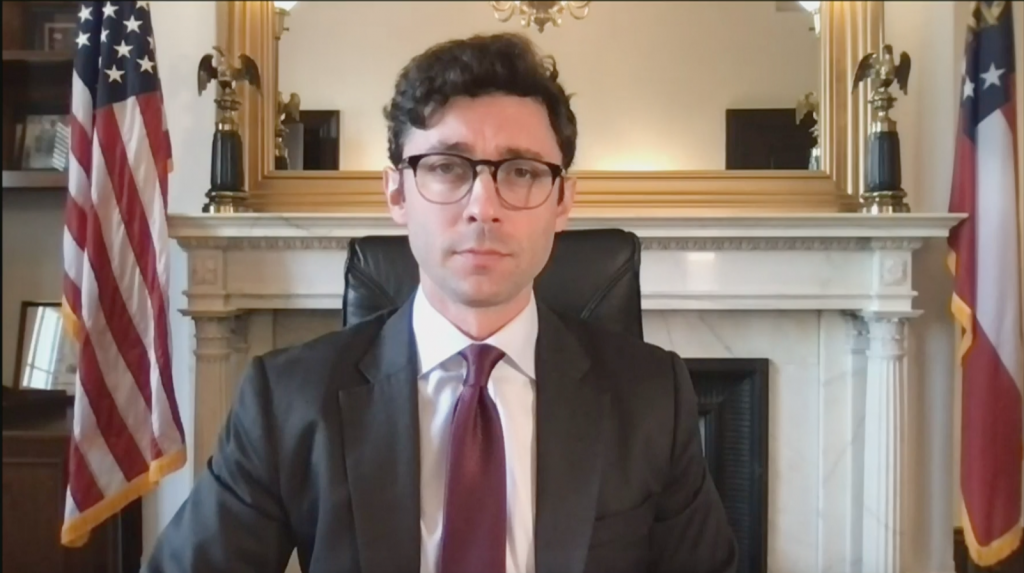
Last week in a U.S. Senate Homeland Security and Governmental Affairs Committee hearing, Senator Jon Ossoff secured a commitment from a key Biden Administration appointee to help fix Georgia’s broken unemployment insurance system, as thousands of Georgians who lost their jobs during the pandemic reported months-long delays in the processing of their applications for emergency support from Georgia’s Department of Labor.
According to a report released by the Georgia Budget and Policy Institute in February 2021, the Georgia Department of Labor’s reliance on outdated technology is one of the key factors contributing to ongoing, widespread processing delays.
Sen. Ossoff asked Robin Carnahan, President Biden’s nominee to be the Administrator of the federal General Services Administration, to commit to helping Georgia’s Department of Labor upgrade their systems. Carnahan committed to do so.
Sen. Ossoff stressed the fact that for thousands of Georgians who lost their jobs due to the COVID-19 pandemic, the delays in unemployment insurance payments caused additional financial distress for families across the state in the midst of a public health crisis.
In March, Sen. Ossoff joined Senator Reverend Raphael Warnock, Congresswoman Carolyn Bourdeaux (GA-07), and members of the Georgia congressional delegation in calling on the U.S. Department of Labor to investigate sweeping delays in the processing of approved unemployment benefits throughout the COVID-19 pandemic.
Click here to watch Sen. Ossoff’s line of questioning:

Please find a transcript of the exchange below:
SEN. OSSOFF: “Ms. Carnahan, my office has been inundated with requests for assistance from Georgians who, through no fault of their own, experienced job loss due to the COVID-19 pandemic, and despite meeting eligibility criteria to receive unemployment benefits from Georgia’s Department of Labor, have experienced long, long delays in the processing and payment of their approved claims, which has sent them and their families into financial distress in the midst of a pandemic. These payment delays involving Georgia’s Department of Labor were detailed in a report released by the Georgia Budget and Policy Institute in February of this year, and according to that report, a reliance on outdated technology at Georgia’s Department of Labor is one of the key factors contributing to these ongoing delays, which is leaving Georgians in hardship. So will you please commit to working with my staff and using the authorities and expertise of the GSA to assist state and local governments in improving these processes, including specifically supporting improvement of Georgia’s Department of Labor’s unemployment claims processing system, so [that] so many Georgians are not left without vital support in a crisis?”
CARNAHAN: “Thanks for bringing that issue up, Senator. This is something that’s happened across the country, Georgia is not alone in this, I know it feels like it sometimes, but every state has had similar issues because these unemployment systems were, frankly, not invested in for so many years and then were overwhelmed. But that’s no excuse. And now we have to think of this as an opportunity to rebuild better. What we know is, that these unemployment systems from one state to the next are very similar, they’re more similar than they are different. And so the key here, Senator, I believe, is to help figure out how to think about shared services that don’t have to be reinvented and rebuilt and paid for by taxpayers over and over again in every state, and if there are things that we can do to help that collaboration. So I’m very interested in this topic, I know GSA has the ability to have technical talent and some resources that can be supportive of both the Department of Labor and, to a lesser degree, states. I’d like to be able to expand our ability to work with state and local governments because, frankly, Senator, from a citizen’s perspective, they don’t care which part of government serves them, they just want good service. And from a taxpayer’s point of view, it’s tax money to the federal government or the state government, they want it well spent. And so I think it’s GSA’s responsibility to try to work on that.”
# # #


Bulloch Public Safety
05/27/2025 Booking Report for Bulloch County

Bulloch Public Safety
05/05/2025 Booking Report for Bulloch County

Bulloch Public Safety
05/19/2025 Booking Report for Bulloch County

Bulloch Public Safety
05/12/2025 Booking Report for Bulloch County

Bulloch Public Safety
05/16/2025 Booking Report for Bulloch County









